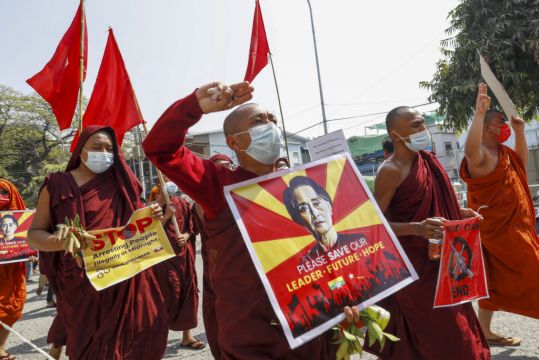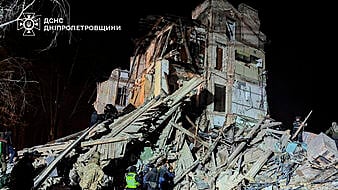Police in Myanmar have filed a new charge against ousted leader Aung San Suu Kyi, her lawyer said, which may allow her to be held indefinitely without trial.
Lawyer Khin Maung Zaw told reporters after meeting with a judge in the capital Naypyitaw that Ms Suu Kyi has been charged with violating Article 25 of the Natural Disaster Management Law, which has been used to prosecute people who have broken coronavirus restrictions.
Ms Suu Kyi, who was ousted in a military coup on February 1, has already been charged with possessing walkie-talkies that were imported without being registered.
The maximum punishment for the Covid-19 violation is three years’ imprisonment.

However, the new charge may allow her to be held indefinitely without trial because a change in the Penal Code instituted by the junta last week permits detention without court permission.
Ousted President Win Myint was charged under the same law when he and Ms Suu Kyi were detained during the army’s takeover.
Ms Suu Kyi held the top government post with the title of state counsellor.
Groups of demonstrators turned out in Yangon and other cities on Tuesday to protest over the coup and demand that Ms Suu Kyi and members of her ousted government be freed from detention.
In Yangon, police blocked off the street in front of the Central Bank, which protesters have targeted amid speculation online that the military is seeking to seize money from them.
Buddhist monks demonstrated outside the UN’s local office.
The protests are taking place in defiance of an order banning gatherings of five or more people.
Around 3,000 demonstrators – mainly students – returned to the streets in Mandalay, the country’s second biggest city, carrying posters of Ms Suu Kyi and shouting for the return of democracy.

Security presence was low-key around the march, with most police guarding key buildings in the city, such as state bank branches.
On Monday in Mandalay, soldiers and police violently broke up a gathering of more than 1,000 protesters in front of the Myanmar Economic Bank.
They attacked the protesters with catapults and sticks, and police could be seen aiming long guns into the air amid sounds that resembled gunfire.
Local media reported rubber bullets were fired into the crowd and that a few people were injured.
The government ordered internet access blocked on Sunday and Monday nights without giving a reason.
It has in the past few weeks imposed selective and ineffective blocks on social media platforms and prepared a draft internet law that would criminalise many online activities.
There is also widespread speculation that the government is installing a firewall system that can monitor or block most or all online activity.
State media were acknowledging the protest movement with indirect references.

The Global New Light of Myanmar newspaper reported about a meeting of the State Administration Council, the new top governing body, and quoted its chief, Senior General Min Aung Hlaing, saying the authorities “are handling the ongoing problems with care”.
It said the council discussed taking legal action against protesters, providing “true information” to the media, and resuming public transport, an apparent reference to strikes and slowdowns by truckers and state railway workers.
The newspaper also said the council members discussed acting against a “parallel government” established by some elected legislators of Ms Suu Kyi’s National League for Democracy party, who were prevented from taking their seats when the military stopped parliament from opening its session February 1.
The self-styled Committee Representing the Pyidaungsu Hluttaw has 15 members who met online and said it has enough support to convene parliament.
It stakes a claim to being the sole legitimate government institution and has appealed to foreign powers and the UN and other multilateral institutions for recognition, with no known positive responses.
Committee members believe warrants have been issued for their arrests.
The military contends there was fraud in last year’s election, which Ms Suu Kyi’s party won in a landslide, and says it will hold power for a year before holding new elections.
The state election commission found no evidence to support the claims of fraud.

The military says its takeover is legitimate under a 2008 constitution that was drafted under military rule and ensures the army maintains ultimate control over the country.
The UN, US and other governments have urged it to return power to the elected government and release Ms Suu Kyi and other detainees.







